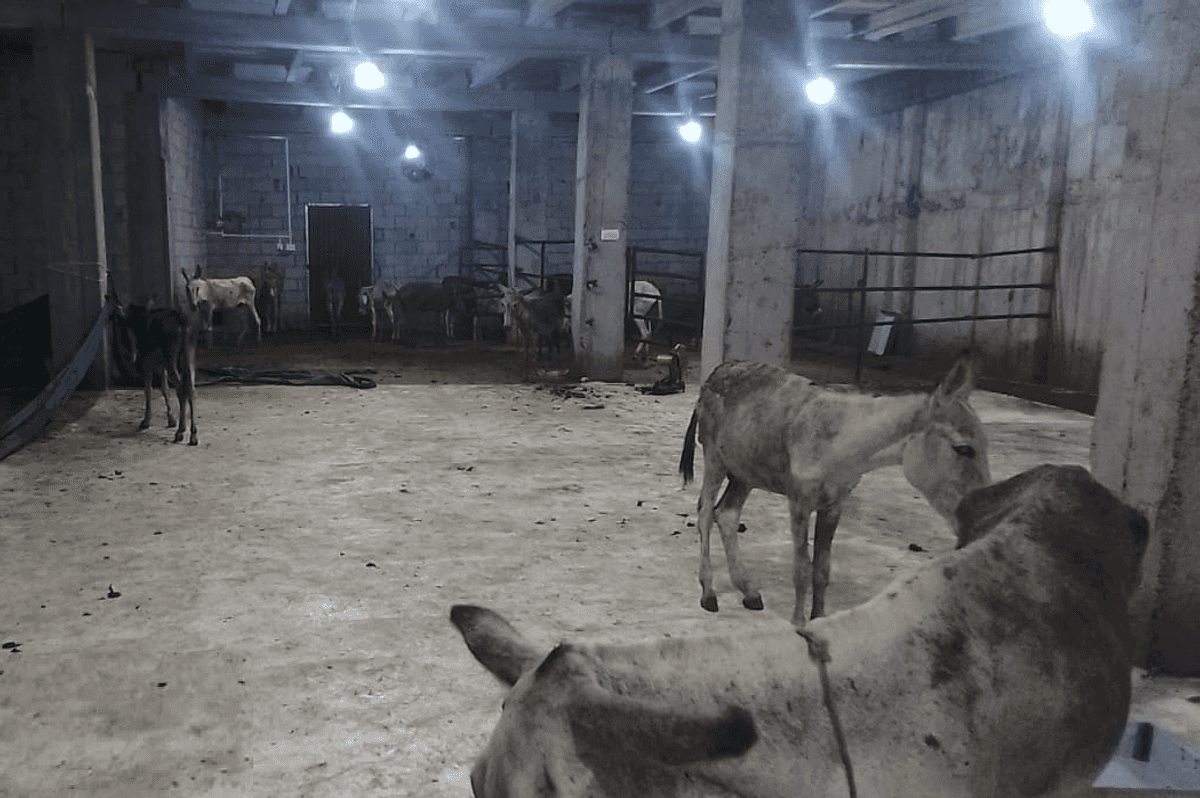Illegal donkey slaughterhouse uncovered on outskirts of Pakistan’s capital
Area residents say they never saw donkeys being transported; a foreign national was caught red-handed and is now under interrogation

Asma Kundi
Producer, Islamabad
Asma Kundi is a multimedia broadcast journalist with an experience of almost 15 years. Served national and international media industry as reporter, producer and news editor.

Photo of the slaughterhouse on Islamabad’s outskirts where donkeys were kept.
Nukta
Authorities in Pakistan’s capital, Islamabad, have uncovered an illegal donkey slaughtering operation on the city’s outskirts, seizing over 1,000 kilograms of donkey meat and rescuing around 40 live animals.
The discovery came after a two-week surveillance operation led by the Islamabad administration and food authority.
The raid, carried out at a farmhouse near Tarnol, was prompted by a tip received earlier this month. Officials from the Islamabad Food Authority and district administration oversaw the operation.
“A foreign national allegedly overseeing the operation was arrested on the spot, and a local security guard was later apprehended,” Memon said in a video statement.
“We never saw trucks go in or out”
Local residents expressed surprise at the discovery. “We share a boundary wall with that property, but I never saw any activity suggesting donkeys were being brought in,” a neighboring resident told Nukta.
“No large trucks or vehicles were ever seen entering the premises. If anything happened, it must have been during the late-night hours -- I really can't say for sure.”
When Nukta visited the location, the surrounding area was found to be emitting a strong, unpleasant odor. One resident noted, “This foul smell only started after the authorities raided the place. Before that, there was no noticeable odor. I suspect they might have been using some kind of chemical to suppress the smell.”
According to Memon, the facility appeared to have been recently set up, possibly as a makeshift slaughterhouse intended for butchering and distributing donkey meat. No licenses, documentation, or records of distribution were found at the site, raising serious concerns about food safety and public health.
“Our team in Islamabad had been actively working to identify any illegal or unauthorized food-related activities,” Memon explained. “We received information about a week ago and have been investigating since then. When our team reached the location, they found some cut-up donkey meat and around 40 live donkeys tied up. The meat weighed approximately 1,000 kg.”
Investigation underway into purpose and reach
Authorities are now working to determine the scale and intended destination of the meat. “There are mixed reports about the purpose of this operation, including possible export or supply to non-Pakistani nationals,” Memon said.
“We’re currently trying to determine how long this operation has been going on and where the meat was being distributed. The police are using technology to trace the supply chain and identify those involved.”
Memon emphasized that this appears to be an isolated incident. “In the past two years, we’ve conducted numerous surprise inspections at restaurants and never found evidence of such activity. We’re also now conducting random checks and meat sampling at other establishments to ensure compliance,” he added.
The arrested foreign national, reportedly from an East Asian country and in Pakistan on a 90-day visa, is being interrogated with the help of a translator. As of now, authorities say no concrete information has been obtained regarding a broader network or client base.
A case has been registered under the Islamabad Food Safety Act, 2021, and the investigation is ongoing. Authorities have pledged to share updates and expect to reach a conclusive outcome soon.
While rare, this is not the first time Pakistan has seen cases involving donkey meat. In previous years, similar reports surfaced in cities across Punjab, including Lahore, prompting crackdowns by local food safety authorities.







Comments
See what people are discussing